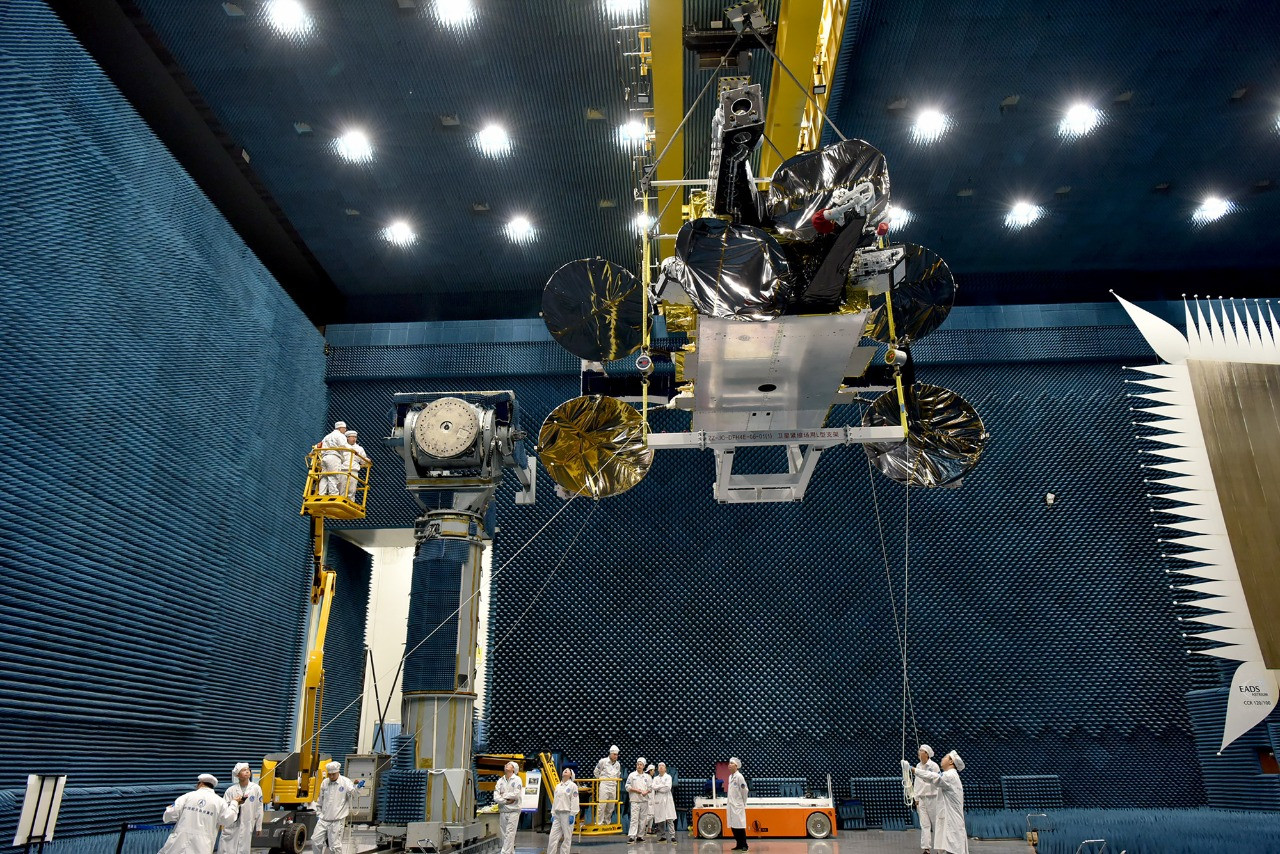Popular Reads
Top Results
Can't find what you're looking for?
View all search resultsPopular Reads
Top Results
Can't find what you're looking for?
View all search resultsWhy we must defend orbital slots for our satellites
With tensions in the South China Sea on the rise, the urgency of filling the 123°E GSO slot is evident.
Change text size
Gift Premium Articles
to Anyone
T
he encouraging news of Indonesia’s plan to launch the SATRIA-1 communication satellite into the 146°E geostationary orbit (GSO) slot by October 2023, after funding from HSBC totaling at US$545 million, is to be greatly welcomed.
The operation of the satellite will significantly strengthen Indonesia’s communication system particularly during and post-pandemic, when most people are working and studying from home. As an archipelago, the country is in dire need of a stable and strong internet connection.
However, one must not forget the skeleton in the cupboard -- the empty 123°E GSO slot resulting from a fiasco in the procurement of a defense satellite, which caused the government to lose funds after failing to secure investment to pay Airbus as the satellite manufacturer. Furthermore, the government failed to pay Avanti Communications’ satellite lease contract, and had to pay a severe penalty after losing an arbitration case.
The government then appointed PT Dini Nusa Kusama (DNK) to fill the orbit, but the company also failed to secure the necessary funds to build and launch the satellite.
The 146°E GSO slot is not without problems. Back in 2019, during the International Telecommunications Union (ITU) World Radiocommunication Conference, the Indonesian government managed to secure an extension to the deadline to fill up both the 123°E and the 146°E GSO slots to 2024 and 2023 respectively, several years behind the actual deadlines under the seven-year bring-Into-use (BIU) ITU rule.
Another orbital position that we have to closely watch is the 113°E GSO slot that was supposed to be filled by the NUSANTARA-2 Satellite, which suffered a launch failure last year. Since then, the ITU has approved an extension of the launch deadline to 2024 to fill the orbital position, and the government has transferred the concession from Indosat to Telkom.
Despite the apparent certainty of the SATRIA-1 satellite project filling the 146°E GSO slot, we need to anticipate the loss of the 123°E GSO slot, a strategic orbital position for a communication satellite. Furthermore, the latter is also ideal for defense and security purposes - imagine if another country gets the slot that covers the archipelago 24/7. With tensions in the South China Sea on the rise, the urgency of the 123°E GSO slot is evident
The ITU regulates and decides which states shall have the right to use an orbital position for their national interests, and the seven-year BIU rule applies equally based on the ITU radio regulations. It is up to each state how they allocate the GSO slots. In Indonesia’s case, the authority lies with the Communications and Information Ministry under Government Regulation No. 53/2000. However, no regulatory safeguard is stipulated to keep the GSO slots filled with Indonesian satellites.
Article 3 of the regulation authorizes the ministry to create a utilization plan for frequency spectrum and orbital positions, to commission research and development to assess the use of those spectrum and orbital positions; and to issue permits for the usage of those spectrum and orbital positions. This article should promulgate a specific mechanism as to how an Indonesian national can apply for a frequency or orbital allocation, which Ministerial Regulation No. 9/2018 actually covers.
However, the 2018 regulation fails to provide detailed separate planning for orbital allocation. It only mentions that the orbital allocation arrangement lies within Article 69, which mandates a director general with the responsibility to apply, coordinate and notify anything related to the use of frequency and orbital positions to the ITU.
Both regulations fail to stipulate a national “waiting list” that can be used as a backup plan, in case the assigned operator fails to launch a satellite into its designated orbital position -- in this specific case, the GSO. The list can act as a safeguard guaranteeing that the GSO positions that Indonesia has the right to place satellites in are always filled, be it by its nationals or government institutions when there is no applicant wanting to fill the position
Another matter that neither regulation mentions is the due diligence of the operators or applicants for the orbital position, specifically how will they prove that they are ready to be given parking rights in an orbital position. This could be achieved by mandating three requirements.
First, proof of an operator's financial viability and stability and a clear investor agreement to ensure the continuity of the project. Second, proof that an operator has the required technical expertise, specifically how much time it needs to design, build and launch its satellite. Third, is the preparation of a back-up plan in case there is a failure to put a satellite into orbit. In other words, a back-up satellite ready to be launched in a shorter period of time to prevent Indonesia losing the slot.
At this point, it is hard to see how the government will ensure the 123°E GSO slot remains in the country’s hands, since the assigned operator has yet to launch its satellite. Nevertheless, an amendment to the existing regulation is needed to ensure that Indonesian GSO slots will be filled, for communication, defense or security purposes.
In the end, the government must remain on alert, as it may lose three GSO slots if Indonesia fails to launch satellites on time. Especially with regard to the 123°E GSO slot, the Defense Ministry could play a role through its huge budget to modernize Indonesia’s defense capability in outer space.
***
Ridha Aditya Nugraha teaches air and space law studies, in the international business law program, University of Prasetiya Mulya. Alif Nurfakhri Muhammad is a lecturer in the International Law Department, University of Indonesia’s School of Law. The views expressed are their own.










